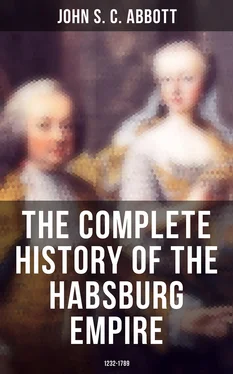Deeply chagrined by this result, Maximilian was able to raise only three thousand men, instead of the nine thousand which he had promised the league. Charles VIII., informed of the formidable coalition combining against him, and not aware of the feeble resources of the emperor, apprehensive that the armies of Germany, marching down and uniting with the roused States of Italy, might cut off his retreat and overwhelm him, decided that the "better part of courage is discretion;" and he accordingly abandoned his conquests, recrossed the Apennines, fought his backward path through Italy, and returned to France. He, however, left behind him six thousand men strongly intrenched, to await his return with a new and more powerful armament.
Maximilian now resolved chivalrously to throw himself into Italy, and endeavor to rouse the Italians themselves to resist the threatened invasion, trusting that the diet of Germany, when they should see him struggling against the hosts of France, would send troops to his aid. With five hundred horse, and about a thousand foot soldiers, he crossed the Alps. Here he learned that for some unknown reason Charles had postponed his expedition. Recoiling from the ridicule attending a quixotic and useless adventure, he hunted around for some time to find some heroic achievement which would redeem his name from reproach, when, thwarted in every thing, he returned to Austria, chagrined and humiliated.
Thus frustrated in all his attempts to gain ascendency in Italy, Maximilian turned his eyes to the Swiss estates of the house of Hapsburg, now sundered from the Austrian territories. He made a vigorous effort, first by diplomacy, then by force of arms, to regain them. Here again he was frustrated, and was compelled to enter into a capitulation by which he acknowledged the independence of the Helvetic States, and their permanent severance from Austrian jurisdiction.
In April, 1498, Charles VIII. died, and Louis XII. succeeded him on the throne of France. Louis immediately made preparations for a new invasion of Italy. In those miserable days of violence and blood, almost any prince was ready to embark in war under anybody's banner, where there was the least prospect of personal aggrandizement. The question of right or wrong, seemed seldom to enter any one's mind. Louis fixed his eyes upon the duchy of Milan as the richest and most available prize within his grasp. Conscious that he would meet with much opposition, he looked around for allies.
"If you will aid me," he said to Pope Alexander VI., "I will assist you in your war against the Duke of Romagna. I will give your son, Caesar Borgia, 1a pension of two thousand dollars a year, will confer upon him an important command in my army, and will procure for him a marriage with a princess of the royal house of Navarre."
The holy father could not resist this bribe, and eagerly joined the robber king in his foray. To Venice Louis said—
"If you will unite with me, I will assist you in annexing to your domains the city of Cremona, and the Ghiaradadda." Lured by such hopes of plunder, Venice was as eager as the pope to take a share in the piratic expedition. Louis then sent to the court of Turin, and offered them large sums of money and increased territory, if they would allow him a free passage across the Alps. Turin bowed obsequiously, and grasped at the easy bargain. To Florence he said, "If you raise a hand to assist the Duke of Milan, I will crush you. If you remain quiet, I will leave you unharmed." Florence, overawed, remained as meek as a lamb. The diplomacy being thus successfully closed, an army of twenty-two thousand men was put in vigorous motion in July, 1499. They crossed the Alps, fought a few battles, in which, with overpowering numbers, they easily conquered their opposers, and in twenty days were in possession of Milan. The Duke Ludovico with difficulty escaped. With a few followers he threaded the defiles of the Tyrolese mountains, and hastened to Innspruck, the capital of Tyrol, where Maximilian then was, to whom he conveyed the first tidings of his disaster. Louis XII. followed after his triumphant army, and on the 6th of October made a triumphal entry into the captured city, and was inaugurated Duke of Milan.
Maximilian promised assistance, but could raise neither money nor men. Ludovico, however, succeeded in hiring fifteen hundred Burgundian horsemen, and eight thousand Swiss mercenaries—for in those ages of ignorance and crime all men were ready, for pay, to fight in any cause—and emerging from the mountains upon the plains of Milan, found all his former subjects disgusted with the French, and eager to rally under his banners. His army increased at every step. He fell fiercely upon the invaders, routed them everywhere, drove them from the duchy, and recovered his country and his capital as rapidly as he had lost them. One fortress only the French maintained. The intrepid Chevalier De Bayard, the knight without fear and without reproach , threw himself into the citadel of Novarra, and held out against all the efforts of Ludovico, awaiting the succor which he was sure would come from his powerful sovereign the King of France.
1.Cæsar Borgia, who has filled the world with the renown of his infamy, was the illegitimate son of Alexander VI., and of a Roman lady named Yanozza.
CHAPTER VI.
MAXIMILIAN I.
From 1500 to 1519.
Table of Contents
Base Treachery of the Swiss Soldiers.—Perfidy of Ferdinand of Arragon.—Appeals by Superstition.—Coalition with Spain.—The League of Cambray.—Infamy of the Pope.—The Kings's Apology.—Failure of the Plot.—Germany Aroused.—Confidence of Maximilian.—Longings for the Pontifical Chair.—Maximilian Bribed.—Leo X.—Dawning Prosperity.—Matrimonial Projects.—Commencement of the War of Reformation.—Sickness of Maximilian.—His Last Directions.—His Death.—The Standard by which his Character is to be Judged.
Louis XII., stung by the disgrace of his speedy expulsion from Milan, immediately raised another army of five thousand horse and fifteen thousand foot to recover his lost plunder. He also sent to Switzerland to hire troops, and without difficulty engaged ten thousand men to meet, on the plains of Milan, the six thousand of their brethren whom Ludovico had hired, to hew each other to pieces for the miserable pittance of a few pennies a day. But Louis XII. was as great in diplomacy as in war. He sent secret emissaries to the Swiss in the camp of Ludovico, offering them larger wages if they would abandon the service of Ludovico and return home. They promptly closed the bargain, unfurled the banner of mutiny, and informed the Duke of Milan that they could not, in conscience, fight against their own brethren. The duke was in despair. He plead even with tears that they would not abandon him. All was in vain. They not only commenced their march home, but basely betrayed the duke to the French. He was taken prisoner by Louis, carried to France and for five years was kept in rigorous confinement in the strong fortresses of the kingdom. Afterward, through the intercession of Maximilian, he was allowed a little more freedom. He was, however, kept in captivity until he died in the year 1510. Ludovico merits no commiseration. He was as perfidious and unprincipled as any of his assailants could be.
The reconquest of Milan by Louis, and the capture of Ludovico, alarmed Maximilian and roused him to new efforts. He again summoned the States of the empire and implored their coöperation to resist the aggressions of France. But he was as unsuccessful as in his previous endeavors. Louis watched anxiously the movements of the German diet, and finding that he had nothing to fear from the troops of the empire, having secured the investiture of Milan, prepared for the invasion of Naples. The venal pope was easily bought over. Even Ferdinand, the King of Arragon, was induced to loan his connivance to a plan for robbing a near relative of his crown, by the promise of sharing in the spoil. A treaty of partition was entered into by the two robber kings, by which Ferdinand of Arragon was to receive Calabria and Apulia, and the King of France the remaining States of the Neapolitan kingdom. The pope was confidentially informed of this secret plot, which was arranged at Grenada, and promised the plunderers his benediction, in consideration of the abundant reward promised to him.
Читать дальше












